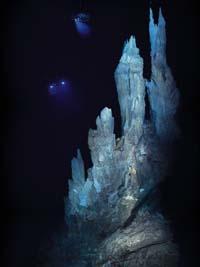The Lost City, source of abiotic hydrocarbons

Ocean hydrothermal sources emit large amounts of liquids and gases into the sea, such as methane and other hydrocarbons. Most hydrocarbons are generated in buried organic matter when rot and undo. But they also arise, according to a study by some American oceanographers.
Hydrocarbons were collected in a hydrothermal area of the Atlantic called the Lost City and the isotopes of carbon atoms were studied. There were no signs of carbon isotope 14 --the typical isotope of the living -; the carbon-13 isotope was found, but the higher the hydrocarbon, the lower the carbon-13 --contrary to what happens in the living. These data indicated that hydrocarbons have not been produced from organic matter, but through inorganic reactions. Of abiotic origin.
Oceanographers believe that hydrogen is produced by reaction of the minerals from hydrothermal chimneys with sea water and that hydrocarbons are formed by reacting with the neighboring carbon atoms. Methane is the most produced, the smallest hydrocarbon, but kerosene and octane have also been detected in the Lost City.





